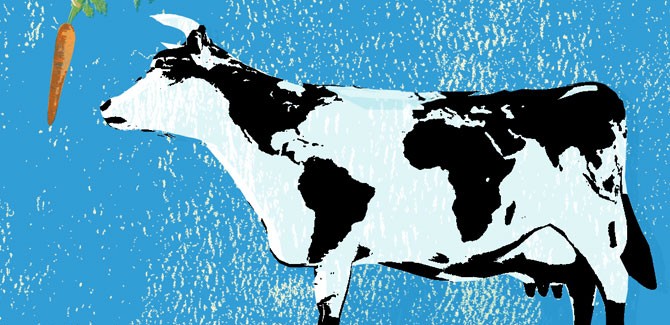Christian activist: We must stop eating like this - Reform Magazine
 Dixe Wills presents the challenge of veganism
Dixe Wills presents the challenge of veganism
How risky is your life? Do you sometimes cross the road just after the green man has turned red? Or perhaps you get your thrills from drilling holes in walls without first checking whether there’s a live cable behind them? All well and good, I suppose, but if you really want to know what risk is all about, imagine yourself as a calf being born to a dairy cow.
‘It was the killing of tiny calves that pushed me from vegetarianism into veganism’
Let’s toss a coin. Call right and you’re born a heifer, in which case you’ll probably spend two to three years pregnant and – if mastitis, bovine viral diarrhoea, infectious bovine rhinotracheitis, leptospirosis, Johne’s disease or bovine TB doesn’t kill you first – you could live to the grand old age of six. If you call wrong and you’re born male, you might get lucky and live for about 30 weeks before being turned into veal or, more likely, you’ll be whisked away from your mother and killed before you’re even 48 hours old. Now that’s what I call risky.
It was the killing of tiny calves that eventually pushed me from decades of strict vegetarianism into the brave new world of the born-again vegan. It was the logical extension of my reasoning for becoming a vegetarian in the first place: I didn’t want animals killed for my benefit. It was a wrench giving up ice cream, butter, cheese (I would once have gladly slaughtered whole people groups for a slice of halloumi – happily it rarely came to that) yoghurt and the rest, and it was a shock to find dairy products in the most unlikely of places (check out the ingredients next time you eat some salt and vinegar crisps) but, a few years in, veganism has become my default setting and I can’t imagine myself ever turning back.
Curiously, one of the major ways in which my life has changed is in the reaction of omnivores when they learn of my choice of diet. In my merely vegetarian era, I was used to meat-eaters displaying an instant and often quite aggressive defensiveness. Vegans, on the other hand, appear so off the scale to omnivores that we can instead be treated as members an amusing if misguided cult.
My favourite response is one proffered by a great many Christians. “Ah ha!” they ejaculate, in the manner of someone who is about to checkmate their opponent: “But Jeeeeesus ate fish”. Leaving aside the fact that the only mention of this in the Bible is when the post-resurrection Christ pops some piscine matter in his mouth to prove to his petrified disciples that he’s not a ghost, it hardly addresses the point that what might have been acceptable in the first century might be rather less appropriate today. There was, for instance, no danger back then of driving the fish of Lake Tiberias into extinction.
Even if one refuses to buy into the animal welfare concerns that veganism raises – and there are factory farms in this country that would turn your stomach if you ever had the misfortune to visit them – one should at least recognise the biblical call to wise and compassionate stewardship. To be blunt: in a world of finite resources and mass hunger, it is simply indefensible to eat so much meat.
It’s not just about the oft quoted statistics regarding the amount of grain it takes to make a pound of beef (it’s about 16 pounds by the way – assuming it is beef and not horse). In a world in which fresh water is becoming ever scarcer, it’s salutary to think that it also takes 5,200 gallons of Adam’s ale to produce a pound of beef. Do by all means turn the tap off while doing your teeth, but as the toothbrush expels the remains of that quarter-pounder from your molars you might reflect on the fact that your hamburger took 1,300 gallons’ worth of water to create. Compare that with crops like tomatoes which, despite being water-intensive, still only use up 23 gallons per pound.
Then there’s the little matter of climate change. A dizzying 18% of all the world’s greenhouse gases are produced by livestock – that’s more than the combined total for every form of transport on the planet (yes, including planes).
But enough of the guilt trip. Vegans are, on average, healthier than carnivores. And when it comes to food shopping we’re also freed from the tyranny of choice. I used to say that jokingly, but there is a certain relief in going into a grocer’s or a supermarket and knowing that whole swathes of shelves need not detain me in the slightest.
So, go on, try going vegan for a day a week and see how you get on.
And remember, if Jesus were trying to prove to you today that he was real, he’d probably eat a carrot.
Dixe Wills is a journalist and author. His latest book is Tiny Islands (AA, 2013)
___
This article was published in the July/August 2013 issue of Reform.
Read more articles by Dixe Wills











Submit a Comment